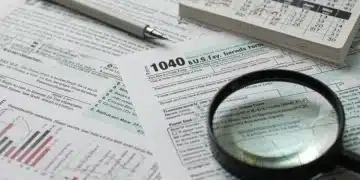Tax-saving tips for self-employed professionals to maximize deductions

Tax-saving tips for self-employed professionals include understanding deductible business expenses, maximizing retirement contributions, utilizing home office deductions, exploring health insurance options, and keeping accurate records to simplify filing.
If you’re a self-employed professional, using tax-saving tips for self-employed professionals can be vital for your finances. Have you thought about how to make the most of your tax situation? Let’s dive into some effective strategies.
Understanding deductible business expenses
Understanding deductible business expenses is essential for self-employed professionals looking to reduce their tax liability. Knowing what you can deduct can help you keep more of your income.
What Qualifies as a Deductible Expense?
Businesses often have various expenses that are necessary for operation. These expenses can include things like rent, supplies, and utilities. Determining what qualifies as a deductible expense can be straightforward if you keep accurate records.
- Office supplies: Anything from paper to computers that you use for work can often be deducted.
- Travel expenses: If you travel for business meetings or conferences, those costs may be deductible.
- Professional services: Fees paid to accountants or consultants that directly relate to your business can also be deducted.
- Home office expenses: If you work from home, a portion of your home’s costs may qualify as a deduction.
It’s important to track these expenses throughout the year. Keeping well-organized records not only helps when tax season arrives but also ensures that you don’t miss any potentially significant deductions. Consider using accounting software to simplify this process and maintain detailed records of your business spending.
Further Considerations for Deductions
When claiming deductions, make sure they are both ordinary and necessary for your business. The IRS defines ordinary as common and accepted in your industry and necessary as helpful and appropriate for your business. Failing to meet these criteria can lead to disallowed deductions, which can be problematic during audits.
Consulting with a tax professional can greatly enhance your understanding of deductible business expenses and ensure you’re maximizing your tax benefits while remaining compliant with regulations.
Maximizing retirement contributions for savings
Maximizing retirement contributions is a crucial step for self-employed professionals aiming to secure their financial future. Understanding the different options available can help you save more effectively.
Types of Retirement Accounts
There are several retirement accounts available to self-employed individuals, each with its own benefits. Increasing your contributions can lead to significant tax savings and a larger nest egg for retirement.
- Solo 401(k): This allows you to contribute both as an employee and as an employer, maximizing your total contribution.
- SEP IRA: A simplified employee pension allows for larger annual contributions, making it easier to set aside more funds.
- Traditional IRA: Traditional IRAs offer tax-deductible contributions and tax-deferred growth until retirement.
- Roth IRA: Contributions are made after taxes, but qualified withdrawals are tax-free, making them appealing for many.
Knowing the contribution limits for each type of account can significantly impact your retirement savings. For example, the annual limit for a Solo 401(k) can be much higher compared to a Traditional IRA, allowing for greater accumulation of wealth.
Benefits of Maximizing Contributions
Maximizing your retirement contributions can provide tremendous benefits beyond just saving for the future. Higher contributions can reduce your taxable income, allowing you to save on taxes in the present. It also prepares you for a more comfortable retirement, where you can maintain your lifestyle without financial stress.
Engaging a financial advisor or tax professional can provide personalized guidance on the best strategies for your specific situation. They can help you navigate the complexities of retirement planning and ensure you are maximizing your contributions wisely.
Utilizing home office deductions strategically

Utilizing home office deductions strategically can provide significant tax benefits for self-employed professionals. Knowing how to leverage these deductions can help you save money while working from home.
What Qualifies for Home Office Deductions?
There are specific guidelines that dictate what qualifies for home office deductions. The space you use must be exclusively for business purposes. This means that it cannot be used for personal activities, which differentiates it from other home expenses.
- Dedicated workspace: Having a room or a clearly defined area of your home that is solely for work is essential.
- Home office supplies: Items like desks, chairs, and computers used for business can often be deducted.
- Utilities: A portion of your electricity, internet, and water bills may be deductible based on the size of your home office relative to your entire home.
- Repairs and maintenance: If you make repairs specifically for your home office, those costs can often be deductible.
Tracking these expenses is important. Keeping accurate records can help ensure you take full advantage of all possible deductions. It can also streamline the process when filing your taxes, making it easier to substantiate your claims.
Calculating Home Office Deductions
There are two methods for calculating home office deductions: the simplified option and the regular method. The simplified method allows you to deduct a flat rate for each square foot of your home office up to a maximum limit. This method can save you time and hassle. However, the regular method allows for a more detailed calculation of your actual expenses, potentially leading to higher deductions.
Ultimately, understanding how to utilize home office deductions can lead to significant savings. By carefully documenting your expenses and choosing the right calculation method, you can ensure you are making the most of your home office setup.
Exploring health insurance options for savings
Exploring health insurance options can be a rewarding way to find savings as a self-employed professional. Understanding the different types of plans can help you make informed decisions that align with your budget and healthcare needs.
Types of Health Insurance Plans
Several health insurance options are available to self-employed individuals. Each plan type offers unique features and benefits, which can affect your overall savings.
- Individual Health Plans: These plans are designed for individuals and can be tailored to fit specific healthcare needs, typically purchased through private insurers.
- Health Savings Account (HSA): Combining insurance with a tax-advantaged savings account can help you pay for qualified medical expenses, often leading to savings over time.
- Marketplace Plans: Options available through the Health Insurance Marketplace can showcase subsidies to reduce costs for those who qualify, making necessary healthcare more affordable.
- Short-term Health Insurance: While not full coverage, these plans can provide temporary solutions for unexpected gaps in insurance.
Understanding the details of these plans is crucial. Before committing to a plan, review the coverage options, premiums, co-pays, and deductibles to ensure you’re choosing the best fit for your situation.
Evaluating Your Healthcare Needs
Another important step in exploring health insurance options involves assessing your healthcare needs. Consider the frequency of doctor visits, any ongoing health conditions, and the types of specialists you may need to see. This evaluation can guide you towards a plan that not only meets your budget but also your specific health requirements.
Moreover, never underestimate the value of preventive care. Many health plans cover preventive services without additional costs, which can lead to long-term savings by keeping you healthy and potentially avoiding more extensive medical treatments.
Keeping accurate records to simplify filing
Keeping accurate records is essential for self-employed professionals aiming to simplify their tax filing process. Good record-keeping can save you time and stress when tax season arrives.
Why Accurate Records Matter
Maintaining precise records helps you track your income and expenses throughout the year. This can provide a clear picture of your business finances and ensure you can substantiate any deductions you claim. Furthermore, in the event of an audit, having detailed records can protect you and help resolve issues quickly.
- Income Tracking: Keep track of all sources of income, including payments from clients and any side gigs.
- Expense Documentation: Save receipts for all business-related purchases, from supplies to travel costs.
- Organize Financial Statements: Regularly compile your profit and loss statements to gauge your business health.
- Use Accounting Software: Consider using tools that can help streamline the record-keeping process and keep your data organized.
To make things easier, establish a system for managing your records. You might choose a physical filing system or a digital approach, depending on what works best for you. Regularly updated records reduce the time spent searching for documents during tax season.
Best Practices for Record-Keeping
Set a schedule for reviewing and updating your records, whether that’s weekly, monthly, or quarterly. If you stay on top of your finances, you will find it less overwhelming at year-end. Keeping a separate bank account for business transactions can also clarify your finances and make tracking easier.
Finally, make sure to back up your records, whether digitally or physically. Losing important information can complicate your filing process and lead to missed deductions or errors on your tax return.
FAQ – Self-Employment Tax-Saving Strategies
What are deductible business expenses?
Deductible business expenses include costs directly related to running your business, such as supplies, travel, and home office expenses.
How can I maximize my retirement contributions?
To maximize retirement contributions, consider using accounts like a Solo 401(k) or SEP IRA that allow for higher contribution limits.
What home office deductions can I claim?
You can claim deductions for a dedicated workspace, home office supplies, utilities, and specific repairs made to your office area.
Why is keeping accurate records important?
Accurate records help track income and expenses, simplify your tax filing, and provide necessary documentation in case of an audit.





